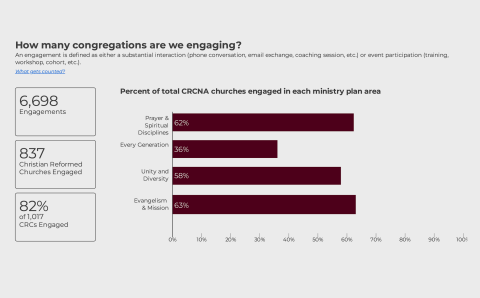Twenty-five years ago a little booklet was published by CRC Publications called “Authentic Worship in a Changing Culture.” This resource, written at the height of the worship conflict in many Christian Reformed churches, continues to speak to us today:
When our hearts are right, we will refuse to be controlled by caricatures of the worship of those with whom we disagree. We will resist labels like “traditional” and “contemporary” when they are used to put down others. We will quit trashing hymnals and traditions and quit using highly judgmental words like “ditties” and “schlock” (today we say things like “7/11 songs,” which is equally offensive) to describe contemporary music. We will not come to church looking for things with which we disagree in worship, but we will come to WORSHIP, regardless of what happens “up front” in a particular worship service (p. 52).
Recently two separate, short articles in The Banner caused these labels of “traditional” and “contemporary” to be escalated yet again into unnecessary and divisive worship-war talk. Worship directors and planners were disappointed. I wish we were past these old arguments. Worship is so much more complex and nuanced and important and rich! We cannot reduce it to the generalizations of older hymns against newer songs or youth versus seniors.
There are many modern worship songs written in standard hymn form. Are these to be categorized as contemporary songs or as hymns? There are non-hymns written in the 1970s (e.g., “Lord, I Lift Your Name on High” and “Shine, Jesus, Shine”) that we use in worship. Are those “contemporary” simply because they aren’t hymns? Where does “Will You Come and Follow Me,” by Scottish minister and musician John Bell, fit in these two limited categories? What about “In Christ Alone”? Hymn or contemporary? Both? Neither? What about “Father, Let Your Kingdom Come,” by The Porter’s Gate? This was written very recently, making it contemporary in the sense of “now.” Is it then in the “contemporary” group? In what ways is it similar to or unlike “Way Maker” or “Open the Eyes of My Heart”? All of these are more or less “contemporary,” but the forms are so different that they really can’t all be put into one simple category.
I’m sure you see the point I’m trying to make. The word “hymn” refers to the compositional form of a particular song (syllabic, rhymed, versified), and “contemporary” is a word indicating a time frame, usually a relatively recent or current context. Comparing these categories is like the proverbial apples and oranges comparison.
Could we do better by thinking more imaginatively? Let’s not reduce the work of worship planning to an arbitrary two categories of music. I am deeply grateful for Greg Scheer’s helpful book Essential Worship: A Handbook for Leaders, from which I have gleaned these five “spectrums” of categories to use when planning worship music:
- Simple versus complex
- Familiar versus new
- Formative (head/doctrine) versus expressive (heart/emotion)
- Pastoral (comfort) versus prophetic (challenging)
- Congregational versus presentational
We must also consider tone, mood, theme, church season, congregational context, and length of service. Perhaps instead of asking if any song is either “contemporary” or a hymn, why not ask how the song connects with the message and the themes we are exploring together? How does this song help me pray? How does it help me praise? How do all the other parts of worship—images, readings, prayers, sermon—also reveal God to me? How does worship reveal to me ways I can grow in faith? What do we need to sing today? Do we need to lament? Do we need to lean into global worship?
My hope and prayer is that we learn to be open to worshiping God through all that is offered in a service—even the parts we may not like.
Editor’s Note: After The Banner accepted this article for publication, a version of it later appeared on the Reformed Worship blog.
About the Author
Ruth Ann Schuringa is the worship director at Mountainview Christian Reformed Church in Grimsby, Ont. As an endorsed worship coach for CRC Worship Ministries, she has led seminars, workshops, and conferences throughout Ontario. Read more of her writing at mountainviewcrc.org/worship.









